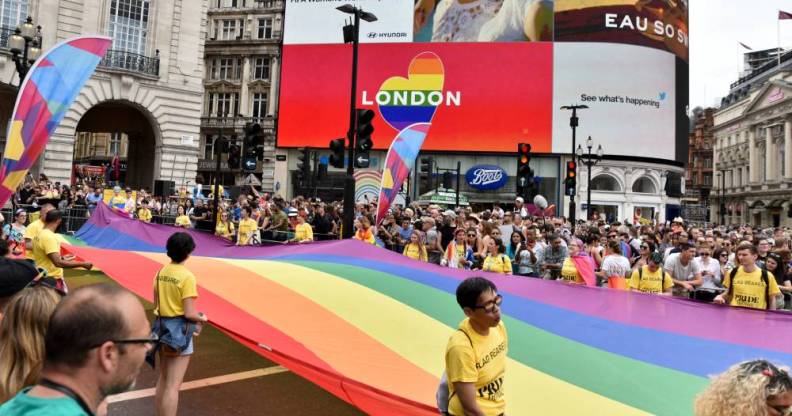Pride in London apologises for racism and bullying, vows to be ‘anti-racist’

The Pride in London 2019 Parade passes through Piccadilly Circus. (Photo by Matthew Chattle/Barcroft Media/Barcroft Media via Getty Images)
Pride in London has issued an apology for allegations of racism and bullying riddling the organisation.
The non-profit has been plagued by demands for new leadership and a fundamental rethink of how the UK’s largest Pride march operates over accusations of racism and bullying. Five directors – including co-chairs Michael Salter-Church, who founded the organisation, and Alison Camps – resigned in March following allegations of a hostile environment for people of colour within Pride in London.
Pride in London said in a statement on Thursday (13 March) that it had “listened to and engaged with individuals, community groups and allied associations” over the past weeks who shared their “experiences, hurt and also support” for the non-profit.
The organisation said it wanted to apologise to the community and individuals who “experienced racism, bullying or any other form of discrimination” while volunteering with Pride in London. It also apologised for “our shortfalls in acting swiftly to recognise and resolve these issues”.
Christopher Joell-Deshields, executive director of Pride in London, said the past few weeks had been “challenging and personally painful” as a member of the Black queer community. He added racism “not only chips away at Black lives daily in society”, but there is “also a level of racism that exists within the wider LGBT+ community” that “remains a problem”.
“Picking up the mantle of leadership to deliver transformative change is no easy task but it is one I feel truly proud of and optimistic about,” Joell-Deshields said. “As Pride in London moves forward we will continue to listen and create a space that values diverse views and incorporates these into its culture, processes and decision making.”
He continued: “The leadership team will drive the dynamics of a cultural change that uproots all forms of discrimination.
“I want queer people of colour to feel safe, be seen, be heard, be respected and be celebrated within the organisation.”
Pride in London added it is committed to being “actively anti-racist” and to have a culture that is “reflective of the rich diversity of London and its LGBT+ community”. The non-profit said it has launched a plan to “set out clear actions to get us back to being an organisation people feel proud to support, volunteer with and work for”.
Pride in London said it would implement its “Proud of Pride” plan before its next event in September. As part of this plan, Pride in London said it would diversify its leadership team so it is “at least 50 per cent representative of minority and ethnic voices”, which it said was a process that was already underway.
The non-profit added it would provide a new suite of policies and processes to support volunteer experiences. This would include “discriminatory, complaints, disciplinary and a code of conduct with zero tolerance towards micro aggressions and will elevate minority and ethnic voices”.
Pride in London was rocked by concerns over a culture of racism after its formerly most senior Black staffer, director of communications Rhammel Afflick, quit in March. Afflick said Pride in London’s top leadership seemed unwilling to make the non-profit a safer, more affirming place for Black and brown people.
He said in a statement: “Within the leadership, there is an unfortunate reluctance to accept that the liberation of LGBT+ people must be coupled with the fight against sexism, ableism, racism and other forms of unacceptable discrimination.”
Afflick added he had “personally witnessed” the Pride in London’s “insistence on ignoring Black voices” in the LGBT+ community and among its volunteers.
His departure emboldened around 20 volunteers and its scrutiny body, the community advisory board, to quit shortly after.

